Section A-2
Section A-2
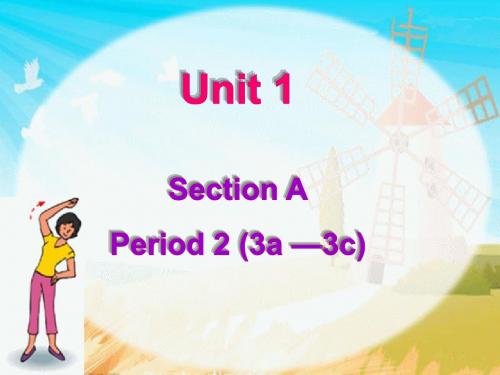
注意: 感官动词 see, watch, observe, notice, hear, look at, listen to, smell, taste, feel +doing 表示 动作的连续性、进行性 感官动词 see, watch, observe, notice, hear, look at, listen to, smell, taste, feel + do 表示动 作的完整性、真实性 I saw him work in the garden yesterday. 昨天我看见他在花园里干活了。 (强调"我看见了"这个事实)
You shouldn't ___________. exercise
What’s the matter? fever I have a _________. drink lots of water and go You should________________________. to bed go out and exercise You shouldn't_____________________.
when常常用来引导时间状语从句,当放在 过去进行时构成的主句之后时,表示主句 动作发生的过程中,另一个意想不到的动 作发生了。 I was thinking of this when I heard my name called. 我正想着这件事时,突然听到有人叫我 的名字。 We were playing outside when it began to rain. 我们正在外边玩,这时下起雨来了。
What’s the matter? I have a _____________. sore throat You should _________________________, drink some hot tea with honey or __________________. go to see the doctor You shouldn't ___________________________ eat dry food such as cookies or _______________. speak too loudly
人教版八年级上册 Unit 2 Section A(2a-2d) 教学设计
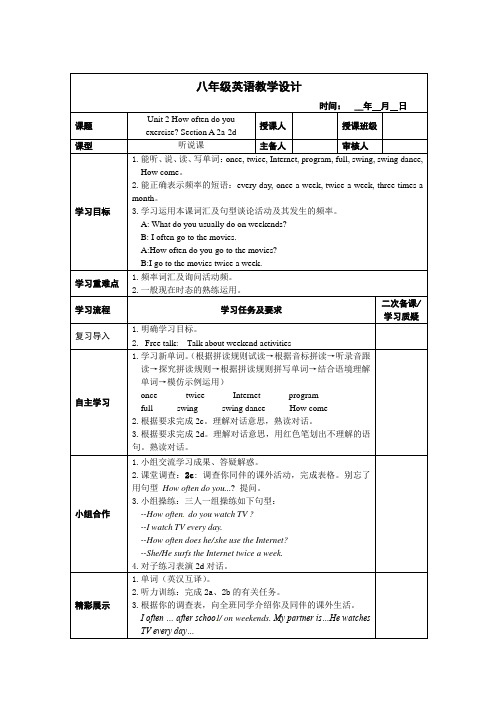
八年级英语教学设计时间: __年月日课题Unit 2 How often do youexercise? Section A 2a-2d授课人授课班级课型听说课主备人审核人学习目标1.能听、说、读、写单词:once, twice, Internet, program, full, swing, swing dance, How come。
2.能正确表示频率的短语:every day, once a week, twice a week, three times a month。
3.学习运用本课词汇及句型谈论活动及其发生的频率。
A: What do you usually do on weekends?B: I often go to the movies.A:How often do you go to the movies?B:I go to the movies twice a week.学习重难点1.频率词汇及询问活动频。
2.一般现在时态的熟练运用。
学习流程学习任务及要求二次备课/学习质疑复习导入1.明确学习目标。
2. Free talk: Talk about weekend activities自主学习1.学习新单词。
(根据拼读规则试读→根据音标拼读→听录音跟读→探究拼读规则→根据拼读规则拼写单词→结合语境理解单词→模仿示例运用)once______ twice______ Internet______ program______full_____ swing_____ swing dance_____ How come_____2.根据要求完成2c。
理解对话意思,熟读对话。
3.根据要求完成2d。
理解对话意思,用红色笔划出不理解的语句。
熟读对话。
小组合作1.小组交流学习成果、答疑解惑。
2.课堂调查:2c: 调查你同伴的课外活动,完成表格。
别忘了用句型How often do you...?提问。
人教版八年级英语上unit 2 sectionA 1a--2d教学设计教案

5.每星期三四次__________6.每月两次_________ 7.帮忙做家务_________8.钢琴课 _________
9.动物世界_________10.你最喜欢的节目 _________
(二)、根据需要填空:
1.The old man ____________(体育锻炼)every morning.
3.及时练,学生完成下面练习。
( )1.I like English very much,so I ______ listen to the tape in the morning.
uallyB.hardly everC.never
( )2.—What does your father do in the evening?
人教版八年级上Unit2sectionA教学设计
【课 题】
Unit 2 How often do you exerciseSection A 1a—2d
【学习目标】
1、熟记运用5个单词:housework、hardly、ever、once、twice
2、掌握2个句型① A: What do you usually do on weekends?
—He usually ____________.
A.watch TVB.exercisesC.read books
( )3.“____________give up,then you can be successful(成功) .”
A.AlwaysB.SometimesC.Never
( )4.I don't like milk but mother wants me _____.
人教版九年级上册英语课件:Unit 2 Section A(1a-2d)(共10张PPT)
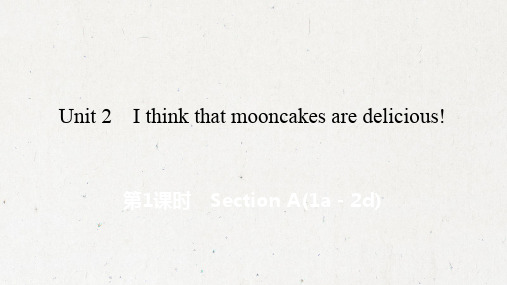
第1课时 Section A(1a-2d)
名师点睛
•词汇冲 • 1.crowded adj.拥挤的。其反关义词为uncrowded(不拥挤的)。短语:
be crowded with挤满了…… • 2.【辨析】believe与believe in。believe表示相信某人的话,而
the races.比尔和玛丽都相信他们明年还会回来观看龙舟比赛。
• 该句包含一个that引导的宾语从句,作动词believe的宾语;在宾语从 句中,to watch the races为动词不定式短语,在句中作目的状语。 【拓展】动词不定式作目的状语既可放在主句前,也可放在主句后。 放在主句之前时,要用逗号与主句隔开。例:To get high grades, he works very hard.=He works very hard to get high grades.为 了取得高分,他努力地学习。
• 9.relative n.亲属;亲戚。【拓展】relative还可作形容词,意为
“相对的;有关系的”。 • 10.throw(threw,thrown)v.扔;掷。短语:throw...at...朝……
扔……,把……洒/抛在……上。throw后接所扔的东西,at后接扔的 对象。
•难句解 • Bill and Mary believe that读they'll be back next year to watch
ut
• 5.Don't eat too much, or you'll p_________ on your weight.
• 6.【2018·浙江杭州中考】The train was vreowrydecd_____________ with passengers, so we had to stand.
Section A-2

Can you hang out with us tonight? 3. Inviting: _______________________________ (can/ hang out with us tonight) Refusing: _______________________________ Sorry, I’m not free. I must study for a test. Reason: ____________________________(must) 4. Inviting: _______________________________ Would you like to come to my birthday party? (would like to/come to my ________________ birthday party) Sure. I’d love to. Accepting: _______________________________
c. She had to study for a math test yesterday.
Did she have to study for a math yesterday?
Yes, she did. She didn’t have to study for a math yesterday.
go to the doctor
go to the zoo
A: Can you go to the zoo? B: Sorry, I can’t. I have to help my parents. help my parents A: Can he go to the zoo? C: No, he can’t. He has to help his parents.
英语人教版八年级上册Unit2 Section A 1a-2d
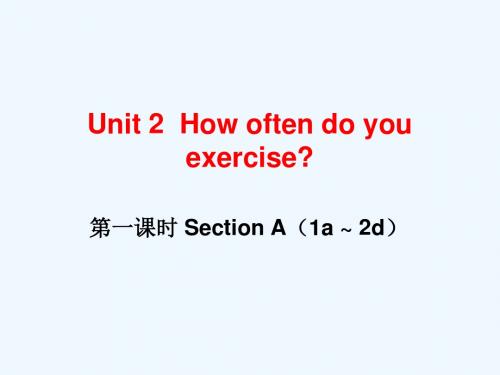
II.用方框内所给单词的适当形式填空。
ever, two, hardly, one, exercise 6. —How many times did you go to Hong Kong? once —Only _______. hardly eat 7. Hamburgers are not healthy food so I ______ them. 8. It is raining harder than ______. ever 9. —Does your father often _________? exercise —Yes. He often runs and plays volleyball. 10. Last year Mary went to Beijing ______ twice —the first time in May and the second ti(1)hardly adv.几乎没有,简直不能,是否定副词。常 放在be动词、助动词、情态动词之后,实义动词之前。 hardly ever意为“几乎从不”,表示否定意义。 (2)hard ①adv.努力地,猛烈地 eg: study hard, work hard ②adj.艰难的,硬的,严厉的 3.once,twice once“一次”,twice“两次”,表示次数,three times “三次”, four times “四次”。 once or twice“一两次”,two or three times“两三次”。 对次数提问用how many times。 4.full full adj.“满的”,常用于be full of…“装满;充 满……”。
III.单项选择。 (A ) 11. —______ does Linda watch English movies? —Once a week. A. How often B. How many C. How far D. How long
人教版英语九年级全册Unit 2 Section A 1a-2d 课件

Task 5 Listen to the conversation between Wu Ming and
1. Wu Ming and Harry are _________.
A cousins B strangers 陌生人 C friends
2. Wu Ming went to _________for his vacation.
A Singapore B Hong Kong C Macao 澳门
3. Wu Ming visited his ________.
lot there. He said: “I believe that we ate at least five meals a day! How delicious the food is!pIu'vteo_n_f_iv_e__p_o_u_n_d_s_____!”He also went shopping.He thinks that Hong Kong is a good placeshopping for_sp_e_n_t___ He______so much money. And Wu Ming liked the Dragon Boat Festival in June bestto. oBhuottit was _____ to see the boat races in June.Harry didn’t mind hot weather. So WuMing tpheirnfekcstit’s a _____time for him to visit Hong Kong.
Section A-2
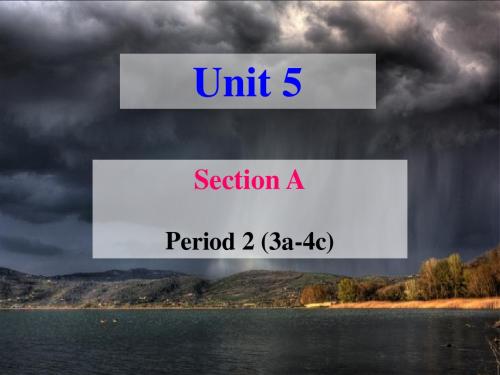
3c Discuss the questions with a partner.
“Although the storm broke many things apart, it brought families and neighbors closer together.” What other things can bring people closer together? How can we help each other in times of difficulty?
2. What was the neighborhood like after the storm? The neighborhood was in a mess. There were fallen trees, broken windows and rubbish everywhere.
Complete the sentences using 3b information from the passage. 1. When the news on TV was reported, strong winds ____________ were blowing outside.
Unit 5
Section A
Period 2 (3a-4c)
3a Read the passage and answer the
questions. 1. What was the weather like before the heavy rain started? Strong winds were blowing, and black clouds were making the sky very dark.
Do the other exercises in this part.
人教版英语七年级上册Unit 2 Section A 2a-2d

A:They are…
Sally: Good morning, Jane.
Is Paul Kate’s brother? _Y_e_s_, _h_e_i_s___.
Jane: Good morning, Sally.
Sally: Oh, Jane, this is my sister Kate.
Kate, this is my friend Jane.
Those are my sisters. And this is me.
I love my family.
A photo/picture of my family . ['fæməli]
Grandfather
['græn(d)fɑːðə]
Sister
['sɪstə]
mother
['mʌðə]
Father
一、根据句意及首字母提示填写单词 1、My father's mother is my g_ra_n__d_m_o_t_h_e_r_. 2、My father's father is my g_ra_n_d__fa_t_h_e_r___.
3、My father and my mother are my p_a_r_e_n_ts____. 4、That is my f__a_m_i_ly_. There are four people in it.
A: Who is he? B: He is Jack. A: Who is she? B: She is his mother. A: Is he/she his …?
B: Yes, he/she is. /No, he/she isn’t.
Unit2 SectionA (1a-2d)分层练习设计九年级英语人教版全册

Unit2 I think that mooncakes are delicious!SectionA (1a-2d)I. 单项选择:(BC层学生必做,A层选做或不做)( )1. ---Guess what? Anna has passed the exam.---____________________!A. What a good newsB. How good a newsC. What good newsD. How good news( )2. I ate a lot and did little exercise, so I ________ 10 pounds.A. put onB. put awayC. put outD. put off( )3. _________ the mooncakes are!A. How deliciousB. What deliciousC. What a deliciousD. How a delicious( )4. I believe _______ he will be back _________two years.A. what, afterB. that, inC. that, afterD. what, in( )5. On my visit to Australia, I feel Australians are similar ________us in many ways.A. withB. forC. inD. to( )6. ---I wonder _______________________.---Yes, of course.A. where we can buy the partsB. how often you hear from your sisterC. if I may have a word with youD. why he arrived late yesterday( )7. ---I’m afraid I can’t go to the meeting.---This is ____________that yo ushould attend it.A. so an important meetingB. such important a meetingC. so important meetingD. such an important meeting( )8. ----How do you like the dishes, Eric?--- Fantastic! Nothing tastes ___________.A. goodB. terribleC. betterD. more terrible( )9. ---I wonder _________Tom will come to our party.---He will when he finishes his work, I think.A. howB. whetherC. thatD. what( )10. ---Would you like to go to the ____________ with me tonight?---Sorry. I’m not interested in music.A. gardenB. concertC. restaurantD. supermarketII. 根据句意、首字母或汉语意思完成所缺单词,每空限填一词。
人教版英语九年级全册Unit 2 Section A 2a-2d 课件

3. What is the time of the Thai New Year? It is the Water Festival.
4. What did people do at the time of the year?
民族团结,和谐社会
balance and coexistence of human and nature 生态平衡,天人合一
(社会主义核心价值观)
prosperity, … , harmony, freedom, justice, patriotism, friendship …
What + a/an + adj.+ 可数n.+ (主语+谓语) !
2b but there were also downsides.
Listen again and fill in the chart.
增加(体重);
Fun activities
Downside发s 胖
Eating out
He has put on five pounds!
Shopping
He spent so much money.
He has _p_u_t_o_n_ five pounds!
Shopping
He spent so much _m_o_n_e_y_.
The Dragon Boat Festival in June
hot It’s quite ____ in June.
Wu Ming did a lot of fun activities,
英语八年级上册《Unit 3(Section A 1a-2d)》
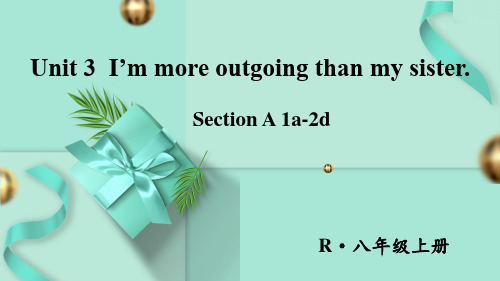
funny friendly outgoing hard-working smart lazy
(run) fast (jump) high (work) hard (get up) early
-er / -ier
friendly funny smart lazy (run) fast (jump) high (work) hard (get up) early
Language Goal:
Talk about personal traits
— Is that Sam? — No, that’s Tom. Sam has longer hair than Tom. — Both Sam and Tom can play the drums, but
Sam plays them better than Tom.
beautiful more beautiful
interesting more interesting
➢ 用所给词的适当形式填空。
My father has __s_h_o_r_t_e_r_ ( short ) hair than my mother. My mother has __lo_n_g_e_r__ ( long ) hair than my father. But my father is __h_e_a_v_i_e_r__ ( heavy ) than my mother and __m_o_r_e__o_u_tg_o_i_n_g__ ( outgoing ) than her.
2c Student A, look at the chart on the right. Student
初中英语人教版七年级下册unit4 section A1a--2c
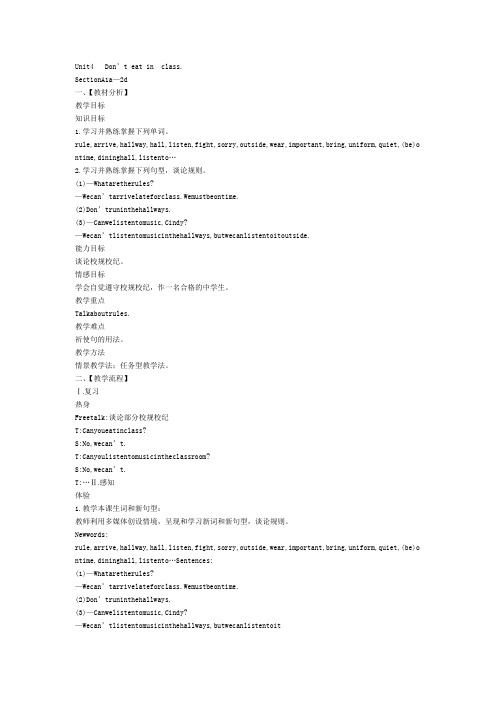
Unit4 Don’t eat in class.SectionA1a—2d一、【教材分析】教学目标知识目标1.学习并熟练掌握下列单词。
rule,arrive,hallway,hall,listen,fight,sorry,outside,wear,important,bring,uniform,quiet,(be)o ntime,dininghall,listento…2.学习并熟练掌握下列句型,谈论规则。
(1)—Whataretherules?—Wecan’tarrivelatef orclass.Wemustbeontime.(2)Don’truninthehallways.(3)—Canwelistentomusic,Cindy?—Wecan’tlistentomusicinthehallways,butwecanlistentoitoutside.能力目标谈论校规校纪。
情感目标学会自觉遵守校规校纪,作一名合格的中学生。
教学重点Talkaboutrules.教学难点祈使句的用法。
教学方法情景教学法;任务型教学法。
二、【教学流程】Ⅰ.复习热身Freetalk:谈论部分校规校纪T:Canyoueatinclass?S:No,wecan’t.T:Canyoulistentomusicintheclassroom?S:No,wecan’t.T:…Ⅱ.感知体验1.教学本课生词和新句型:教师利用多媒体创设情境,呈现和学习新词和新句型,谈论规则。
Newwords:rule,arrive,hallway,hall,listen,fight,sorry,outside,wear,important,bring,uniform,quiet,(be)o ntime,dininghall,listento…Sentences:(1)—Whataretherules?—Wecan’tarrivelateforclass.Wemustbeontime.(2)Don’truninthehallways.(3)—Canwelistentomusic,Cindy?—Wecan’tlistentomusicinthehallways,butwecanlistentoitoutside.2.Makeconversations.(1)—Don’trunint hehallways.—Sorry,Ms.Clark.(2)—Whataretherules?—Well,wecan’tarrivelateforclass.Wemustbeontime. (3)—Canwelistentomusic,Cindy?—Wecan’tlistentomusicinthehallways,butwecanlistentoitoutside.3.Makealistofschoolrules:(1)Don’tarrivelateforclass.Youmustbeont ime.(2)Don’truninthehallways.(3)Don’teatintheclassroom.Youmusteatinthedininghall.(4)Don’tlistentomusicinclass.(5)Don’tfight.Ⅲ.强化巩固1a:Whichrulesarethesestudentsbreaking?Writethenumberoftherulenexttothestudent. 学生独立完成并合作讨论答案,教师检查。
SectionA-2

在体育课上, 我们必须穿运动鞋。
Tom has to practice the guitar every day.
汤姆每天必须练习弹吉它。
I had to get up at 5:00 am last Monday.
上周一, 我不得不早上5点起床。
2) 否定形式: 主语+don’t have to+动词原形 +其他(一般现在时, 主语是第三人称单数时,
Library Rules
1. Don’t talk. 2. Don’t eat. 3. Don’t listen to music. 4. Don’t take photos.
3b. Use the words to make questions
about the rules. Be quiet?
At my dream school, we don’t have to come to school every day. We …
4. Make our school rules
Dear students: In order that we can have a good environment (环境). We should have some rules in our school. Here are some suggestions, we hope that all of us can have a look at them. 1. Don’t sleep in class. 2. Clean the classroom everyday. 3. __________________________ 4. __________________________ 5. __________________________ 6. __________________________ Yours ____
Unit 2 Section A (1a—2d)教案-人教版英语八年级上册
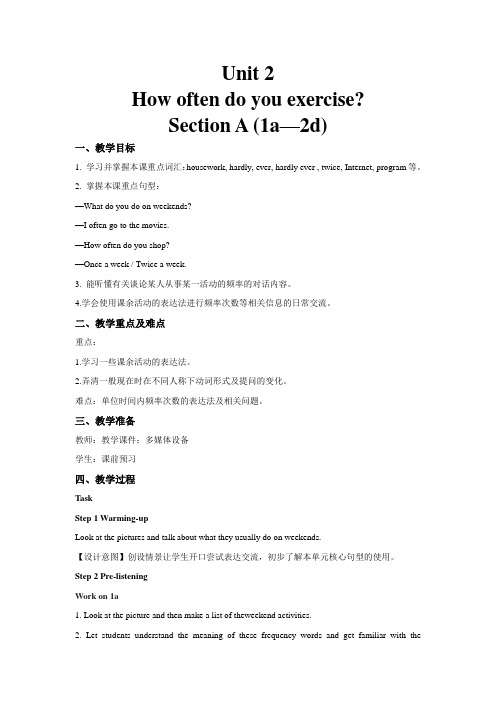
Unit 2How often do you exercise?Section A (1a—2d)一、教学目标1. 学习并掌握本课重点词汇:housework, hardly, ever, hardly ever , twice, Internet, program等。
2. 掌握本课重点句型:—What do you do on weekends?—I often go to the movies.—How often do you shop?—Once a week / Twice a week.3. 能听懂有关谈论某人从事某一活动的频率的对话内容。
4.学会使用课余活动的表达法进行频率次数等相关信息的日常交流。
二、教学重点及难点重点:1.学习一些课余活动的表达法。
2.弄清一般现在时在不同人称下动词形式及提问的变化。
难点:单位时间内频率次数的表达法及相关问题。
三、教学准备教师:教学课件;多媒体设备学生:课前预习四、教学过程TaskStep 1 Warming-upLook at the pictures and talk about what they usually do on weekends.【设计意图】创设情景让学生开口尝试表达交流,初步了解本单元核心句型的使用。
Step 2 Pre-listeningWork on 1a1. Look at the picture and then make a list of theweekend activities.2. Let students understand the meaning of these frequency words and get familiar with theweekend activities.Step 3 While-listeningListen and write the activities next to the correct frequency words.【设计意图】学习频度副词的使用,掌握其中细微的差别,提高学生的听力能力。
Section A-2

4. One woman in the area saw something running away, ….
“see +宾语+ doing”是指“看见某人正在做 某事”, 不是全过程, 表正在进行 I saw the boy singing. 我看到这个孩子正在唱歌。 “see +宾语+ do”是指“看见某人做某事”, 是看着事情的发生全过程 I saw her come. 我看到她来了。
【 2010 福建 · 晋江】 — Lily has a silk ______. Listen, she is singing in the next C room! — How nice! A. look B. noise C. voice 【解析】look 可数名词,意思 是“相貌, 样子,外表 ”,常用复数形式; noise 不可数名词,意思 “噪杂声,吵闹声 ”; voice是可数名词, 意思 是“嗓音,说 话声 ”。
2. … it must be teenagers having fun.
having fun 是分词短语,作定语修饰 teenagers, 相当于定语从句: who are having fun。 The man reading a novel at the desk is my father. = The man who is reading a novel at the desk is my father. 在桌边看小说的人是我父亲。
Section A Period 2 (3a — 3c)
Translate the phrases.
at the picnic belong to pop music hair band attend a concert go to a picnic pick up 在野餐 属于… 流行音乐 发带 出席音乐会;欣赏一场 音乐会 去野餐 捡起
人教版九年级英语全册Unit2 SectionA(1a-2d)+课件

Listen and find out Wu Ming’s and Harry’s opinions.
Let’s listen
Wu Ming believes that Hong Kong is a good place for shopping.
Wu Ming thinks
that he ate at least five meals a day.
2.
w__i_n_d__o_w_. s
Little kids and
even
parents
_d_r_e_s_s__u_ pas
ghosts
or
black
the Spring Festival, the Water Festival, the Lantern Festival, the Drogan Boat Festival, the Mid-autumn Festival
2.learn some new words and phrases.
relative, stranger, lantern, put on , throw..at..,wash away
ห้องสมุดไป่ตู้
泼向/洒向…
throw water at each other
I wonder
the Water Festival
if(是否)
you
love
water.
--I love the water.I think that it is exciting to throw water at each other.
A. the Water Festival B . the races C. the dragon boat teams
- 1、下载文档前请自行甄别文档内容的完整性,平台不提供额外的编辑、内容补充、找答案等附加服务。
- 2、"仅部分预览"的文档,不可在线预览部分如存在完整性等问题,可反馈申请退款(可完整预览的文档不适用该条件!)。
- 3、如文档侵犯您的权益,请联系客服反馈,我们会尽快为您处理(人工客服工作时间:9:00-18:30)。
1. What happened to the man lying on the road? 2. What was the person next to him doing? 3. Was this man dead? 4. Who do you think is going to save the man?
The driver
Passengers Result
1. At 9:00 a.m., bus No. 26 was going along … when the driver saw an old man lying on the side of the road. bus No. 26 was going along …是过去进行时 态,表示在过去某一时刻正在进行或发生 的动作。 I was doing my homework at 9 o’clock p.m. last Sunday. 上个星期天晚上九点我正在做家庭作业。
the driver saw an old man lying on … 是固定结构,即see sb. doing sth. 意思是 “看到某人正在做某事或正处于某种状态” I saw him working in the garden yesterday. 昨天我见他正在花园里干活。 (强调“我见他正干活”这个动作)
1. ____ √ Wang Ping was the driver of bus No. 26 at 9:00 a.m. yesterday. 2. ____ Bus No. 26 hit an old man on Zhonghua Road. 3. ____ √ The old man had a heart problem and needed to go to the hospital right away.
2. … without thinking twice. think twice 认真思考; 三思 I must think twice before I can promise. 在我答应之前,我必须重新考虑一下。 Please think twice about my suggestion. 请你认真考虑考虑我的建议。
3. He got off and asked … get off 下车;出发;动身 Get off at the next stop and take a bus for the airport. 在下一个车站下车并乘公共汽车去机场。 What time will you get off tomorrow? 你明天什么时候动身?
5. But to his surprise, they all agreed to go with him. to one’s surprise 令某人惊讶的是 (常位 于句首) To my surprise, the plan succeeded. 我感到惊奇的是那计划竟然成功了。 类似的结构有: to one's joy / pleasure使某人高兴的是
If you see someone lying on the street, what should you do?
Respect the aged and care for the young. It is a fine tradition of the Chinese nation.
Learn to protect ourselves before helping others.
注意: 感官动词 see, watch, hear, taste, feel +doing 表示动作的连续性、进行性 感官动词 see, watch, hear, taste, feel + do 表 示动作的完整性、真实性 I saw him work in the garden yesterday. 昨天我看见他在花园里干活了。 (强调“我看见了”这个事实)
3c Discuss the questions with a partner.
1. Why was Wang Ping surprised that the passengers agreed to go to the hospital with him? 2. Did the passengers think Wang Ping did the right thing? How do you know?
3. Do you agree that people often do not help others because they do not want to get into trouble? Why or why not?
If you see someone lying on the street, what should you do? Why?
What’s the matter with the old lady?
She has a heart problem.
What would you do if you saw this accident(事故,意外)?
Hale Waihona Puke We should …Look at the title and the picture. Work in pairs and discuss these questions.
agreed to go with him and some passengers helped the driver move the old man onto the bus
Passengers Result
the old man was saved in time.
An old man A woman next to him
I expect that I will be back on Sunday. 我预计我会在周日回来。 expect sb. to do sth. 期望某人做某事 I'm expecting you to telephone me. 我期待你会给我打电话来。
【2011 山东威海】34. What time do you expect her________? A. arrive B. is arriving C. arriving D. to arrive 【解析】考查动词的用法。expect sb. to do sth. 意为“期望/期待某人做某事” ,符合 题意。故选D。
4. ____ The passengers on the bus did not want to go to the hospital, so only Wang Ping went with the woman and old man. √ Some passengers helped to get the 5. ____ old man onto the bus. 6. ____ √ The old man got to the hospital in time.
知识链接
hurt还做及物动词,意思是“使疼痛;受伤” The shoes are too small. They hurt my feet. 这双鞋太小了,我穿着脚痛。 The driver hurt himself badly in the accident. 那位司机在这起事故中伤得很重。 Your words hurt me greatly. 你的话语使我心里受到了极大的伤害。
1). She saw a boy _______ go (go) into your classroom. 她看见一个男孩进了你们的教室。 walking (walk) in the street. 2). I saw him ________ 我看见他正在街上散步。 reading (read) 3). The teacher heard Jim _______ English when she came in. 老师进来时,听见Jim在读英语。
An old man
A woman next to him
lay on the side of the road
shouted for help
stopped the bus wiothout thinking twice
The driver got off and asked the woman what happed decided to sent the old man to the hospital expected passengers to get off and wait for another bus
4. At last, the doctors saved the man in time. (T )
5. One passenger says, “People often don’t want to get into trouble.” ( T )
Read the passage again and check 3b (√) the things that happened in the story.
More Expressions of “get”
get on 上 车 get out 出来 get up 起床 get back 回来 get on / along with 与„„相处
4. He expected most or all of the passengers … to get off … expect v. 期望;预料
及物动词和不及物动词
及物动词 Vt(transitive verb): 后面能直接加宾语(动作的承受者) Eg: He speaks English. 此句中,speak是及物动词,English是其宾语, 即speak的承受者。 不及物动词 Vi(transitive verb): 后面不能直接加宾语。 若需要宾语,需用介词引出。 Eg: He died. 此句中,die是不及物动词 She lies on the bed. 此句中,lie是不及物动词,后需要加宾语,用 介词on引出。
